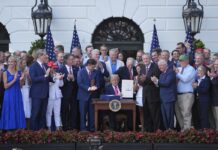
WASHINGTON — A federal advisory panel on Thursday gave the green light to a COVID-19 vaccine developed by U.S. pharmaceutical company Pfizer, completing the next-to-last regulatory step before states begin a massive national vaccination effort.
The Food and Drug Administration still must give its approval on the Pfizer vaccine’s emergency use, but the agency is expected to follow the recommendation from its advisory committee. That FDA decision could come within days, followed by another vote next week on another proposed vaccine from Moderna.
Within 24 hours of FDA approval, nearly 3 million vaccine doses will begin shipping across the country — the first half of two doses required to be administered 21 days apart.
The second dose will be shipped later and another 500,000 doses will be held in reserve, according to officials with Operation Warp Speed, the White House-led initiative to develop and distribute vaccines.
Each state can determine who is prioritized to receive the initial doses, but most will follow federal recommendations to first inoculate health care workers and those in nursing homes and long-term care facilities. Georgia’s Department of Public Health sent a first draft of its vaccination plans to federal public health officials in October.
Federal officials have not confirmed how many doses each state will receive, saying only that those doses will be distributed based on each state’s adult population.
Shifting estimates on how many doses will be available and how quickly — and limited funds from Washington — have complicated planning for state officials, who will oversee efforts within their borders to quickly and safely administer those shots.
Another alarming daily record as COVID cases accelerate in Georgia
The advisory panel’s 17-4 vote Thursday on the vaccine created by Pfizer and its German partner, BioNTech, comes at the end of a rapid process for vaccine development and testing, which has sped along as COVID-19 infections and deaths have risen dramatically in the U.S.
Officials at the day-long virtual hearing underscored those skyrocketing coronavirus case counts, which have surpassed 15 million infections and 290,000 deaths nationally. Dr. Aron Hall, acting chief of the Centers for Disease Control and Prevention’s respiratory viruses branch, said the true number of infections is likely two to seven times higher than official counts.
“It is now becoming very clear, particularly with the recent increasing rates of COVID-19 globally and in the United States … that we need a safe and efficacious vaccine to stem this devastating pandemic,” said Kathrin Jansen, senior vice president and head of vaccine research and development at Pfizer.
She added that other prevention strategies, such as mask-wearing and social distancing, still remain critical.
Federal regulatory officials emphasized that the swiftly developed vaccine was still subject to an intense review process. The FDA released its own analysis of Pfizer’s clinical trial data, which found it prevented 95% of people from becoming sick.
“The American public demands and deserves a rigorous, comprehensive and independent review of the data,” the FDA’s Dr. Doran Fink said.
The question before the federal advisory panel was whether the data available showed the benefits outweighed the risks of administering the vaccine in those 16 and older. That approval is for emergency use, and full approval will require Pfizer to submit additional research to federal regulators.
Pfizer has begun gathering data on the vaccine’s safety among those as young as 12. Pregnant women have been excluded from coronavirus vaccine trials, but FDA officials said Thursday that they expect preliminary results from a developmental and reproductive toxicity study in animals soon.
Officials at the CDC have estimated that women make up 75% of the health care workforce, and that an estimated 330,000 health care workers could be pregnant or have recently given birth as the vaccine rollout begins.
The two groups prioritized nationally for the initial vaccine doses are estimated to include some 24 million Americans: 21 million health care workers and 3 million in nursing homes and assisted-living centers.
The number of people in this initial priority group varies widely across states. A study from Kaiser Family Foundation found seven states in which the number of health care workers who have direct patient contact or who are nursing facility residents is at least 8% of the state’s population: Pennsylvania, Minnesota, Ohio, North Dakota, Massachusetts, New York and Rhode Island.
The timing for a final FDA decision wasn’t immediately clear following Thursday’s vote. That announcement will serve as the starting gun for the vaccine logistics efforts that states have been preparing for months.
Stephen Hahn, who heads the FDA, told NPR this week that the agency likely would make its decision “shortly” after Thursday’s meeting, but that the timing could change if the advisory panel raised substantial questions or recommended additional analyses on the vaccine data.
State officials submitted initial plans earlier this fall to the CDC on how they will distribute vaccines. But states have only received $200 million from the federal government. The National Governors Association said this week that an additional $140 million is forthcoming, but that is far less than the $8.4 billion in federal funding that local and state public health officials have sought to support their vaccination efforts.
This article appears in partnership with Georgia Recorder






